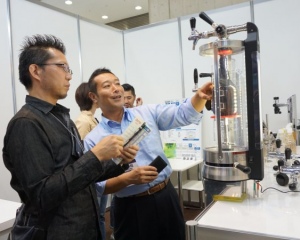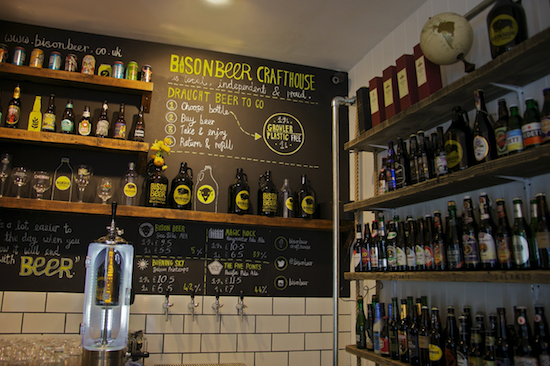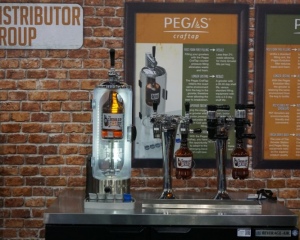
Company News

Growlers taking the off-trade by storm
In the dog-eat-dog beer market off-licences are taking a bite out of the pub trade – thanks to the growler.
Growing numbers of retailers are serving a draught brew or two for takeaway in the glass flagons, taking advantage of the explosion of interest in beers sparked by the craft movement.
The idea comes, as so many do, from the United States, where dropping into a store to pick up fresh beer is commonplace. And now demand from British drinkers is driving the growler culture over here.
Phil Clarke, who launched Growler Store to import and supply brewers, pubs and off licences with branded growlers some 18 months ago, has been “astounded” at the response.
“We’ve been overwhelmed with the interest and are currently getting six or seven enquiries a day – and that’s just the start of it,” he said. “It’s a big opportunity for off licences. Fresh draught beer to take home is just a really good idea. A lot of people don’t go to the pub any more, and it’s a great alternative. Growlers are already massive in the US and when Waitrose start doing it you know it’s going to be big.”
Waitrose is the first major retailer to get on board, installing two draught beer stations at its new shop in London’s Kings Cross last year, teaming up with Camden Brewery.
Customers buy their personal 64-ounce (1.89 litre) growler for £6, and pay £10 to fill it. They can also sample the brew on site, at the store’s wine bar.
“Selling draught beer was something we’d discussed for some time,” says Waitrose’s beer buyer Kate Prall. “We know many of our customers buy flagons of beer at the local brewery, and a visit to the US, where we saw how prevalent growlers are in supermarkets, cemented the possibility for us.
“We chose Camden Brewery as we wanted to work with a locally relevant brewer with an excellent reputation for good quality beers. Sales have been good and fresh beer now account for between 15% and 20% of sales from the bar, which we’re really pleased with. We expect the popularity of growlers to increase as the weather improves, and we’ll be looking to open more beer stations in the future - but nothing is confirmed just yet.”
The new wave of bottle shops that specialise in the superfluity of craft beers that are out there at the moment are, perhaps, a natural home for a growler trade. Bison Beer, which opened in Brighton last March, offers four different craft keg beers, often including its own joint venture brews with Two Tribes Brewery. They are served via a Pegas Craftap.
“It’s expensive kit, £2,000 plus VAT and installation, and growlers have to be filled correctly,” explains Bison founder Nick Vardy. “But stored in a cool, dark place, a fridge or cellar, the beer will keep fresh for up to six weeks. It creates theatre in the shop, too. When they see it, people want it.”
Customers are encouraged to buy a 64-ounce Bison-branded ceramic growler, keep it and re-use it, going back to the shop to fill up for between £12 and £15. There are now some 1,500 bottles out there. “It builds loyalty,” says Vardy. “Though some people put flowers in them – they’re very elegant.
“Growlers give our customers access to beers they can’t get in bottles or cans, and we can offer tasters, educate people and maintain that spirit of exploration, which is what the craft beer market is all about.”

The shop is also about to launch the Bison Growler Club, which will deliver draught beer to member businesses on a Friday. Growlers UK opened its first shop, which sells only draught beer, in Morningside, Edinburgh, back in 2013, and has just opened its second across the city in Leith after successfully crowd-funding £100,000. It’s now planning to launch the concept as a franchise opportunity with the help of consultancy Platinum Wave.
A Pegas filling station will be installed in every future store, said Growlers UK operations manager Matthew Stanford. “It makes a big difference in terms of wastage.”

Each shop offers 10 keg beers and three on cask, and Leith also sells draught cider from bag-in-box. Growlers, which the company imports directly itself, come in one, two and three litre sizes and customers can keep them or return them and get half their £6 to £12 deposit back.
Around 7,500 are in circulation, says Stanford. “It’s a pub pint at home”. And like a good pub, “we change the beers at least every 72 hours and clean the line every time”. Kegs and casks are stored at cellar temperatures and samples are served from taps in the wall.
Stirchley Wines & Spirits in Birmingham is a more conventional kind of off licence, but one that’s specialised in beers and ciders since the late 1980s, with as many as 1,000 different bottles on the shelves. Draught beer was introduced at the end of 2012 using a free flow system and plastic jugs, and owner Krishan Rajput upgraded to a Pegas system and glass growlers last September, doubling his lines from two to four.
Having built up a strong network of suppliers, both brewers and wholesalers, over the years, Rajput is able to continually vary the offer, never pouring the same beer twice and never having a beer on draught that’s also available in bottle.
“There are plenty to choose from now,” he says. “We tend to pick quirky beers and they might come from any country. A keg will last us two or three weeks.
“We’re certainly selling more draught beer as a result of the Pegas system, and though it’s only one facet of our business we’re very pleased with it. We have more confidence in the quality of the serve and there’s less wastage too. It’s well on the way to paying for itself.
“Anyone serious in the beer market will be looking at glass growlers, and they’ll become more prevalent,” he adds. “I can’t see why we shouldn’t see more growler-led shops springing up.”
Have you got what it takes to serve draught beer?
The space – not just for your beer station but somewhere to store the kegs. You may find you need extra cooling to stop fobbing and wastage, or you might buy a portable beer station that keeps the kegs chilled.
The beer – keg probably works best, unless you think you can shift a cask in three days. You might want to choose beers you’re not already selling in bottles or cans.
The growlers – come in all shapes and sizes but if you’re hoping customers will hold onto them and keep coming back to fill up you’ll want a strong ceramic model and you’ll want it branded with the name of your shop.
The equipment – can be minimal if you’re free pouring straight into the growler. If you want the beer to keep more than a day or two in your customer’s fridge, or think you might have a gift market, you should consider investing in a device, such as the Pegas Craftap, that extracts the oxygen and replaces it with carbon dioxide as you fill.
Source: http://www.offlicencenews.co.uk


